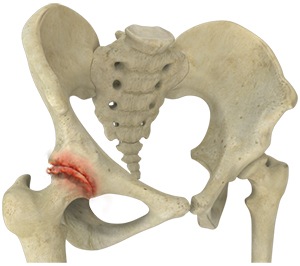Osteoarthritis of the Hip

Osteoarthritis, also called degenerative joint disease, is the most common form of arthritis. This disease affects the tissue covering the ends of bones in a joint (cartilage). The cartilage becomes damaged and worn-out, causing pain, swelling, stiffness and restricted movement in the affected joint. Although osteoarthritis may affect various joints, including the hips, knees, hands and spine, the hip joint is the most commonly affected. Rarely, the disease may affect the shoulders, wrists and feet.
Advanced age is one of the most common reasons for osteoarthritis of the hip. You may also develop osteoarthritis if you had hip injury or fracture in the past, if you have family history of osteoarthritis, or are suffering from hip diseases such as avascular necrosis, other congenital or developmental hip diseases.
You will experience severe pain confined to the hip and thighs, morning stiffness and limited range of motion.
Based on the symptoms, your doctor will perform a physical examination, and order X-rays and other scans, and some blood tests to rule out the other conditions that may cause similar symptoms.
There are several treatments and lifestyle modifications that can help you ease your pain and symptoms of osteoarthritis.
- Medications: Pain-relieving medications such as NSAIDs, COX-2 inhibitors and opioids may be prescribed. Topical medications such as ointments can be applied over the skin. If the pain is very severe, corticosteroid injections can be administered directly into the affected joint to ease the pain.
- Other treatments: Your physiotherapist will teach you exercises to keep joints flexible and improve muscle strength. Heat/cold therapy, which involves applying heat or cold packs to the joints, provides temporary pain relief. Lifestyle modifications can be made to control your weight and avoid extra stress on the weight-bearing joints.
- Surgery: Hip joint replacement surgery is considered as an option when the pain is so severe that it affects your ability to carry out normal activities.













